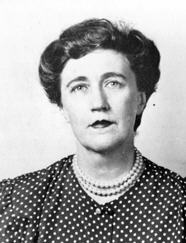 On February 24, 1999, Virginia Foster Durr, a civil rights advocate, died in Carlisle, Pa. Durr was born in Birmingham on August 6, 1903 to a Presbyterian minister, Sterling Foster, and his wife Anne. Various accounts state Durr was raised as a typical Southern girl, one who accepted racial segregation. But as a sophomore at Wellesley College, Durr began to question that aspect of her upbringing. The school’s dining hall had “rotating tables” where the coeds were required to dine with random groups of students, including blacks. At first Durr balked, but was told by school officials she could either comply or leave. Durr chose to stay (until she had to leave due to financial reasons). There she began to step outside of her “magic circle,” as the quote below (taken from her autobiography) explains.
On February 24, 1999, Virginia Foster Durr, a civil rights advocate, died in Carlisle, Pa. Durr was born in Birmingham on August 6, 1903 to a Presbyterian minister, Sterling Foster, and his wife Anne. Various accounts state Durr was raised as a typical Southern girl, one who accepted racial segregation. But as a sophomore at Wellesley College, Durr began to question that aspect of her upbringing. The school’s dining hall had “rotating tables” where the coeds were required to dine with random groups of students, including blacks. At first Durr balked, but was told by school officials she could either comply or leave. Durr chose to stay (until she had to leave due to financial reasons). There she began to step outside of her “magic circle,” as the quote below (taken from her autobiography) explains.
“She [the Southern white woman] could be the actress, playing out the stereotype of the Southern belle. Gracious to ‘the colored help,’ flirtatious to her powerful father-in-law, and offering a sweet, winning smile to the world. In short, going with the wind. If she had a spark of independence or worse, creativity, she could go crazy—on the dark, shadowy street traveled by more than one Southern belle. Or she could be the rebel. She could step outside the magic circle, abandon privilege, and challenge this way of life. Ostracism, bruised of all sorts, and defamation would be her lot. Her reward would be a truly examined life. And a world she would otherwise never have known.”
She married Clifford Durr, a lawyer, in 1926. In 1933, they moved to Washington, D.C. where her husband served in the Hoover administration, and then later Franklin Roosevelt’s. They eventually had five children.
While in D.C., Virginia Durr worked hard to eliminate the poll tax, a tax Southern blacks had to pay before being allowed to vote. The Durrs moved to Montgomery in the early 1950s and soon became involved with the civil rights struggle there. She and her husband helped bail Rosa Parks out of jail after she refused to give up her bus seat to a white man. Throughout the civil rights movement, the Durrs provided invaluable support.
After her husband died in 1975, Durr continued to work for progressive causes, including the eradication of poverty. At the time of her death, President Bill Clinton stated, ”A white woman, born to privilege in the Deep South, Mrs. Durr refused to turn a blind eye to racism and intolerance in our society. Her courage and steely conviction in the earliest days of the civil rights movement helped to change this nation forever.”

She was an unusual and amazing woman. I had the (sometimes scary) privilege of knowing her as a child. (See my post about meeting Rosa Parks at the Durr’s farm in Wetumpka. https://tkthorne.com/2015/12/01/rosa-parks-corn-creek/)
Thank you for sharing your post, TK!